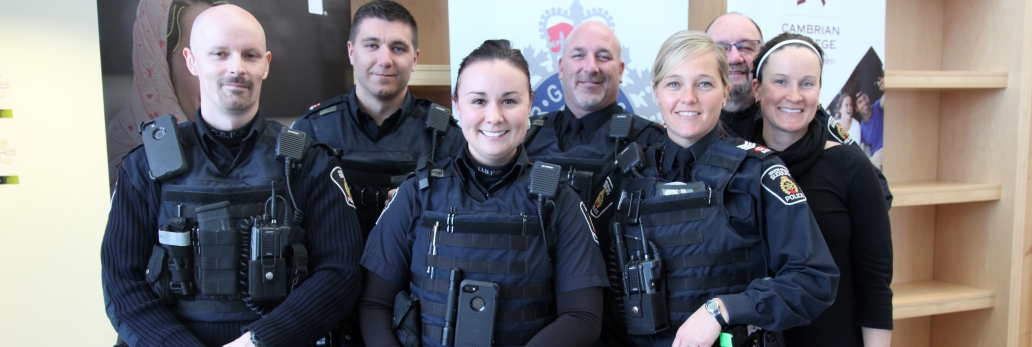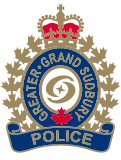
Today, June 3rd, marks two years since the original release of the final report of the National Inquiry into Murdered and Missing Indigenous Women and Girls (MMIWG).
The report contained 231 Calls for Justice, which included some specific Calls for Police Services, such as:
9.2 We call upon all actors in the justice system, including police services, to build respectful working relationships with Indigenous Peoples by knowing, understanding, and respecting the people they are serving.
As we recognize that there is still much work to be done, we reflect on the milestones that we have accomplished in collaboration with our community partners, dating back over 20 years with the creation of our Indigenous Liaison Officer position and Indigenous Community Police Advisory Committee in 1999.
In 2015, prior to the National Inquiry, GSPS proactively reached out to the N’Swakamok Native Friendship Centre to develop a collaborative partnership to expand upon the work that had already been accomplished by our original Indigenous Liaison Officer, Constable Grant Dokis (Retired). Our current Indigenous Liaison Officer, Cst. Darrell Rivers, works with our Criminal Investigations, Patrol, Liaison Team and Community Response and is a voice at many Indigenous community advisory groups as well as being a big support person of the Looking Ahead Project. Much of our work since 2015 has been specifically guided through the very powerful partnership project Looking Ahead to Build The Spirit of Our Women-Learning to Live Free from Violence.
Once the Federal Government released the recommendations from the National Inquiry, our Indigenous Liaison Officer brought all of the recommendations forward to our Indigenous Community Police Advisory Committee (ICPAC) members. ICPAC consists of community members from Kina Gbezhgomi, N’Swakamok, Shkagamik-Kwe Health Centre, Laurentian University, Nogdawindamin, APANO, Atikameksheng and Better Beginnings Better Futures amongst others. ICPAC assisted in reviewing the recommendations that had already been acted upon and advised us on how to best move forward with those that were outstanding.
To date, we have hosted three MMIWG2s+ conferences where family members of Missing and Murdered Indigenous Women and Girls from across North America have been in attendance and provided powerful insight into their experiences. The focus of the conferences was healing and education with an emphasis on culture throughout the experience. Most recently, our 3rd conference was held virtually on March 9th and 10th, 2021.
In 2017, a Sexual Assault Review Team was established to increase awareness of community supports, encourage Survivors to report Sexual Assault to Police and/or community partners, reduce victimization and improve best practices for reporting. There are Indigenous representatives on the review team, as well as, individuals with lived experience in order to ensure a respectful Survivor-centred approach with holistic and traditional healing/support services. In 2019, we entered into a Memorandum of Understanding allowing the review team increased access to cases reaffirming our ongoing commitment to external review and input as the review team has committed to meeting quarterly each year. Please review our Information Guide for Survivors of Sexual Assault.
The GSPS has had an ongoing commitment to continually review its training, policies, practices and procedures to ensure culturally appropriate policing is provided. Our Indigenous Community Police Advisory Committee provides advice and insight to service procedures and practices.
Cultural awareness begins when officers are hired through our Race Relations and Bias Neutral Policing Policy guide practices and training. All of our new Constables spend a day with our Indigenous Liaison Officer as part of the Post Ontario Police College Training program. During this time, members are introduced to service providers in the community as part of their Indigenous awareness cultural mindfulness training. Throughout their career, members are afforded ongoing training sessions in improving access to justice for Indigenous women, intercultural presentations and Indigenous Awareness/Cultural Mindfulness Training with George Couchie. Recently, we held an Indigenous Mental Health First Aid training day.
We conduct outreach recruiting to Indigenous communities to encourage policing as a chosen profession. We also have a wide variety of talents and skillsets of the Indigenous Community dispersed throughout the Service involved in duties such as Equipment and Supplies Services, Computer and Information Technology, Courts, Traffic, Wellness, Intelligence, Community Policing, Criminal Investigations and Front-line Patrol.
In April 2020, we hired an Indigenous Law Student, Taryn Michel, as our Indigenous Training Program Developer. Most recently, we hired an Indigenous Liaison Unit Summer Student, Page Chartrand for Summer 2021. We will introduce you to Page at a later date.
Since 2005, we have been running the Police MKWA (Bear) Opportunity Education Circle Program where Indigenous high school students go on ride-alongs with our Officers and participate in cultural teachings as well as get to learn about the different opportunities at GSPS. This has been a very effective initiative in building trust, respect and lasting relationships with students. The GSPS Chief’s Youth Initiative Fund also consistently donates monies to Indigenous Secondary Students Awards.
GSPS regularly seeks to engage and participate with all of the surrounding Indigenous communities. We are recognized as a group to be included and are regularly invited to be involved.
Our Looking Ahead to Build the Spirit of Our Women - Learning to Live Free from Violence Strategy and an Indigenous Women and Girls Missing Persons Toolkit and Resource Guide have significantly informed our relationships and work with families. The toolkit has recently been translated to French and Ojibwe and both versions will be available shortly on our website.
We have established a strong working relationship with the Family Information Liaison Unit (FILU) to assist in providing information to family in a trauma-informed way. The FILU worker is an important part of the process. The FILU worker establishes a personal connection with the family and assists in getting all of their questions ahead of time, so that there is time for preparation with the goal of only have to go through this process once, maybe twice as it is traumatic. The family meetings consist of Police, the Coroner and the Crown Attorneys if charges occurred. Various family members can be present during these meetings including; partners, children, close extended family and supports. This is a heavy emotional and painful experience. The Family Members are warriors - heart warriors.
Over the last year, the Greater Sudbury Police Service developed four Reframing Policing Reform Groups which include an Authentic Inclusion, Gender Equity and Harassment-Free Workplace reform group and Anti-Racism reform group. The Anti-Racism reform group focuses on identifying barriers in our systems for recruiting, hiring, transferring, promoting, and retaining Indigenous, Black, or diverse members of our organizations, and includes an internal sub-committee comprised of BIPOC members, both Sworn and Civilian.
As June is National Indigenous History Month, our Indigenous Liaison Unit has put together several interactive activities to engage GSPS members and the community, such as a Seven Grandfather Teachings elementary school colouring contest; GSPS beading challenge (which includes a medicine wheel, Anishnaabek flag and bear paw); as well as 30 days of Anishnaabemowin words and phrases.
We continue to expand our learning and understanding of Indigenous history and culture, and nurture our partnerships with Indigenous community members based on trust and respect. We strive to build positive and respectful relationships with the original inhabitants of this land including First Nations people, Inuit people and Métis people. As a Police Service, we are committed to working together with community partners and community members to ensure that Indigenous People and people of all cultures, races and diversity are treated with respect and dignity.
 I Want To
I Want To





 Subscribe to this page
Subscribe to this page